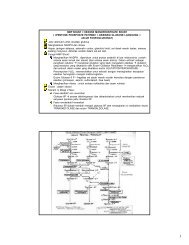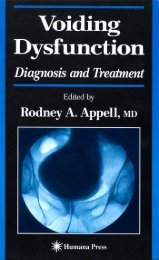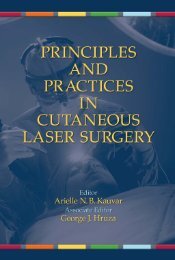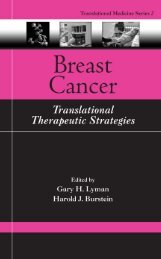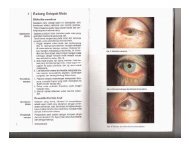International Handbook of Clinical Hypnosis - E-Lib FK UWKS
International Handbook of Clinical Hypnosis - E-Lib FK UWKS
International Handbook of Clinical Hypnosis - E-Lib FK UWKS
Create successful ePaper yourself
Turn your PDF publications into a flip-book with our unique Google optimized e-Paper software.
106 INTERNATIONAL HANDBOOK OF CLINICAL HYPNOSIS<br />
and their clients to understand the latter's problems in the same way; also,<br />
clinicians should always consider alternative hypotheses to account for clients'<br />
problems, and should be especially careful not to ®xate on one <strong>of</strong> those<br />
hypotheses. McConkey's 1997) consideration <strong>of</strong> the available statements and<br />
guidelines underscored general agreement that: a) childhood abuse is a reality<br />
that may have devastating consequences; b) the existence <strong>of</strong> particular problems<br />
in adulthood is not a reliable indicator <strong>of</strong> the occurrence <strong>of</strong> abuse in childhood;<br />
c) memories may be unreliable, and inaccurate memories can be held strongly;<br />
d) the existence <strong>of</strong> repression should not be rejected, but it cannot be accepted<br />
without question; e) recovered memories <strong>of</strong> childhood abuse may or may not be<br />
accurate, and independent corroboration is the only way <strong>of</strong> determining this; f)<br />
clinicians' responsibilities to their clients are best met through a cautious<br />
approach to the assumptions they make and the techniques they use; and g)<br />
clinicians' pr<strong>of</strong>essional and ethical responsibilities are best met by avoiding an<br />
excessive encouragement or discouragement <strong>of</strong> reports <strong>of</strong> childhood sexual abuse.<br />
In a more concrete way, Knapp & VandeCreek 1996) commented on risk<br />
management procedures for psychologists treating individuals who recover memories<br />
<strong>of</strong> childhood abuse. They argued that `effective treatment included maintaining<br />
appropriate boundaries, developing an accurate diagnosis that is based on a<br />
collaborative relationship with the patient, using intervention techniques that have<br />
been empirically derived or in other ways have received the pr<strong>of</strong>ession's endorsement,<br />
obtaining informed consent from patients when using experimental techniques,<br />
and showing concern for the patients' long-term relationship with their<br />
families <strong>of</strong> origin. Consultation in dif®cult cases and careful documentation are<br />
also essential' Knapp & VandeCreek, 1996, p. 455).<br />
These comments highlight that clinicians need to know how to work in a setting<br />
<strong>of</strong> ambiguity, uncertainty, and differential demands. Moreover, to engage in competent<br />
practice clinicians must have a knowledge <strong>of</strong> memory research, an understanding<br />
<strong>of</strong> trauma and memory loss, and must develop speci®c intervention skills<br />
and practices to work with clients who may recover memories. In terms <strong>of</strong><br />
hypnosis, clinicians need to be alert that its use can be potentially problematic; in<br />
particular, hypnosis can <strong>of</strong>fer no guarantee <strong>of</strong> the veracity <strong>of</strong> the reports that it may<br />
elicit, and the memories that are recovered during hypnosis may be very dif®cult to<br />
corroborate independently. Moreover, Pope & Brown 1996) set out speci®c<br />
questions that should be addressed by clinicians considering the use <strong>of</strong> hypnosis to<br />
recover memories: `a) Am I competent in the clinical uses <strong>of</strong> hypnosis as demonstrated<br />
by my education, training, and experience? b) Have I adequately considered<br />
alternative approaches that do not involve hypnosis? c) Have I consulted with<br />
a quali®ed attorney to ensure that I understand the ways that using hypnosis may<br />
affect the client's legal rights e.g., admissibility <strong>of</strong> claims, testimony, or other<br />
evidence based on hypnotically refreshed recollection)? d) Am I adequately aware<br />
<strong>of</strong> the research and theory about the use <strong>of</strong> hypnosis for this population in this<br />
situation? and e) Have I accorded the client full informed consent or informed




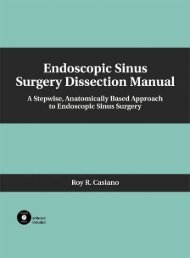
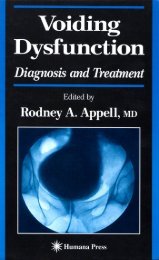


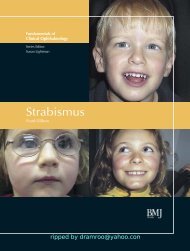
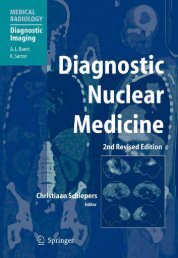

![SISTEM SENSORY [Compatibility Mode].pdf](https://img.yumpu.com/20667975/1/190x245/sistem-sensory-compatibility-modepdf.jpg?quality=85)
